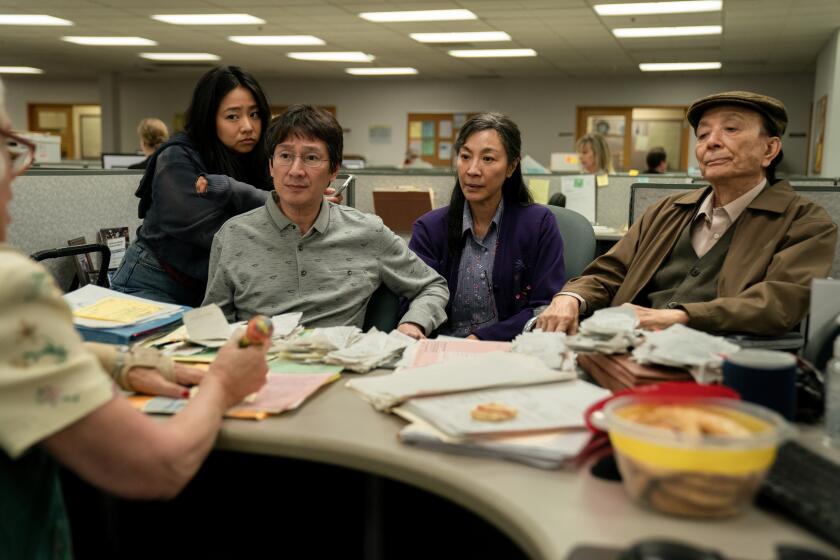How ‘Everything Everywhere All At Once’ stars found heart in the surreal action sci-fi of the year
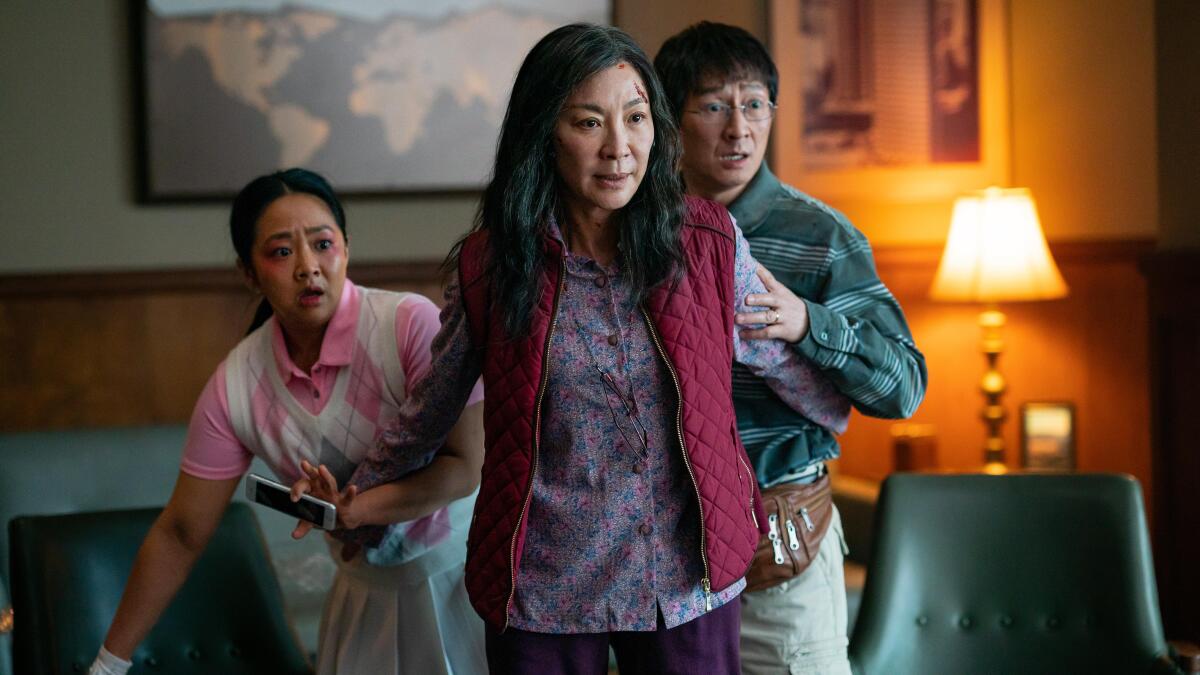
- Share via
Like all great epic tales, the breathtakingly zany “Everything Everywhere All At Once,” starring Michelle Yeoh as a harried everywoman called upon to save the multiverse, is about a simple concept at its core: love.
Not that Evelyn Wang (Yeoh) has time for it. The struggling laundromat she runs with her sweetly goofy husband Waymond (Ke Huy Quan of “Indiana Jones” and “Goonies” fame) is being audited, her elderly father Gong Gong (screen legend James Hong) has come to live with them and she has no idea how to talk to her grown daughter Joy (“The Marvelous Mrs. Maisel‘s” Stephanie Hsu), ill-equipped to bridge the divide between her own immigrant journey and Joy’s lens on life as a queer second-generation American young woman.
Directing duo Daniels brings us a head-spinning, heartbreaking story of multiverses, taxes and the power of family starring Michelle Yeoh.
To get to the heart of the thrillingly dense sci-fi action comedy from directing duo Daniels (a.k.a. Dan Kwan and Daniel Scheinert, known for the poignant 2016 flatulence dramedy “Swiss Army Man”), Evelyn must master interdimensional “verse-jumping” to tap into universes where alternate versions of herself are master chefs, international movie stars and even have hot dogs for fingers — all so she can face off against Joy’s powerful and nihilistic alter ego, “Jobu Tupaki.”
It’s a movie about family, but it also digs into existential questions, says Yeoh: “Is it always better on the other side? ‘If I had made a different choice, my life would be so different. My God, it could have been phenomenal.’ You can have this, but without that. What is it that matters to you?”
She and Hsu beamed in from San Francisco via Zoom ahead of the film’s limited release to discuss the heartwarming beauty of hot dog hands, shooting their first scene together with a unique set of nunchucks and finding big emotions in the absurd maximalism of “Everything Everywhere” (opening wide April 8).
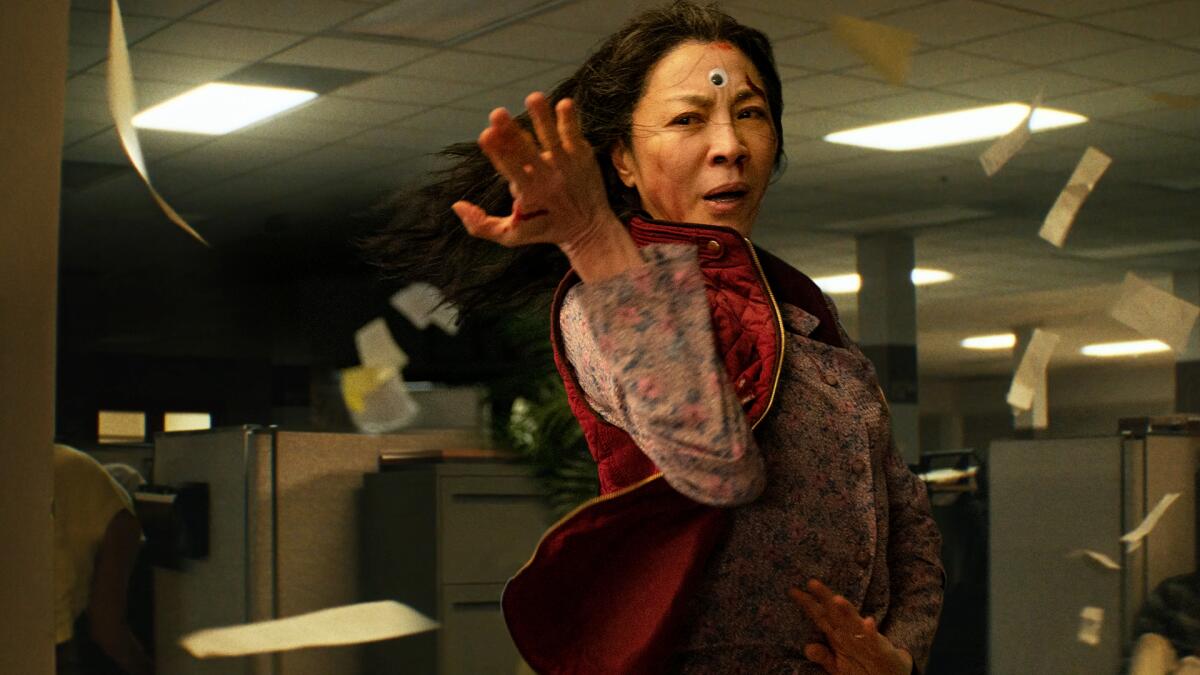
The central characters in this epic story are Evelyn Wang, a very stressed-out laundromat owner, and her daughter Joy. There’s obvious love between them, but also such intergenerational misunderstanding and miscommunication. How did you both relate to these women?
Stephanie Hsu: What I love about this story and these two women is that they are quite ordinary, and that makes them extraordinary in some way. But they’re incredibly imperfect. They’re both trying to find each other and cross this great bridge between them, but failing miserably. And it somehow takes having to go to every single universe to be able to finally realize that the one they have got is the one that they need and perfect in all of its messiness. I really relate to that. I have a mother…
Michelle Yeoh: We all do!
Hsu: We all do! And a mother-daughter relationship is...
Yeoh and Hsu, in unison: Complicated.
Hsu: The love, though … if you live inside of someone else’s body, that type of love is just beyond articulation. But the Daniels, they love strong women. This movie is, I think, for all the strong women in their lives. And when you’re a strong woman, I think vulnerability is scary. Vulnerability can be really powerful, but it can also be scary — especially if you’re an immigrant. There are so many battles to fight, and there are so many ways that you feel like you need to be strong that to enter that tender space might take a two and a half hour movie for you to get to at the very end, you know? The mother-daughter relationship is one that I haven’t seen much of and told like this in such a messy, honest way.
Michelle, how did the Daniels convey to you the scope of their vision for the film and who Evelyn was as the center of this chaotic multiverse?
Yeoh: I read the script and had an inkling of what they were talking about. But only when I met them did I understand the passion they had and why they wanted to tell a story like this. We never see mothers this age, older women, as superheroes. You see men no matter what age as a superhero. But a mother we see a lot of the time almost as invisible because she does what she needs to do to take care of her family, to try and make a success of something and to give her children a much better life. People who are not given the voices that they deserve to have.
Evelyn doesn’t really know how to tell her daughter why she’s doing all these things. Everything is for [Joy], the way she loves her. But all she knows how to say is, “You should cut your hair, you should lose weight, you should do this.” It’s not superficial to her because she believes she’s trying to make you a better person. I think that’s what all mothers do.
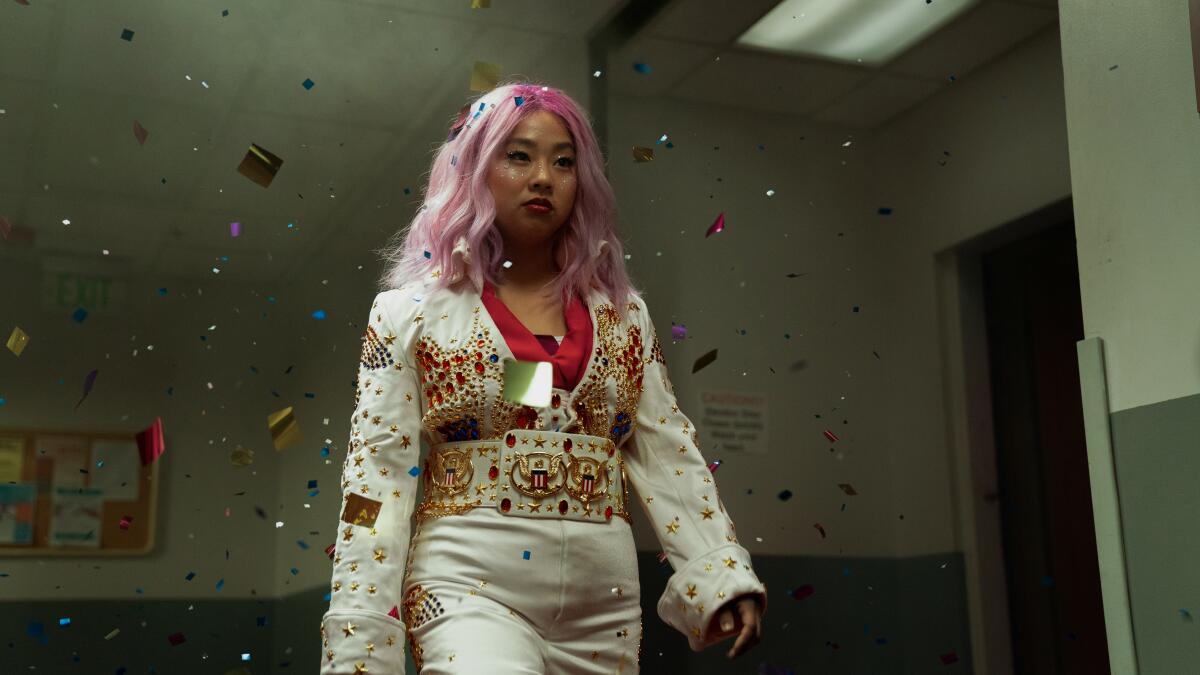
The world of the film lives up to its title. You’re flipping through genres. All these different multiverses and almost unprecedented absurdity. What was going through your mind as you read the script?
Yeoh: The first pass when you read it was a little overwhelming because it’s this and that and what?! Hot dog fingers? And you go, “OK. I’m going to take a step back.” Then I watched “Swiss Army Man” and began to understand what kinds of worlds the Daniels, these two boys, play around in. It’s not the multiverses that really matter, it’s the characters. The one thing that stays with you is that emotion of love. That is what we are looking for through all the craziness, whatever chaos it is.
Stephanie, you’d worked with the Daniels before. Did that give you an inkling of what to bring to your character of Joy and her interdimensional alter ego, “Jobu Tupaki?”
Hsu: They called me and they were like, “Hey, we’re working on this movie.” I had no idea Michelle was attached. I had zero concept of A24. I just was like, “I’ll do anything you guys want because I think you’re so brilliant.” So reading the script, I had a window into their sense of humor already so the dildos, the butt plugs, the hot dog fingers — that kind of washed right over me. I was like, “I get it. Anything can happen, so everything is going to happen.”
How did you two first meet? What helped you forge the kind of bond you’d need to portray Evelyn and Joy’s emotional history?
Hsu: We had Korean barbecue for dinner for the weekend before we started filming. But because Michelle flew in right before we started filming, one of the first scenes we shot was the introduction of Jobu in the hallway — the “swinging dildo” scene. That was an audition scene, so I had done it with [the directors] and they would often give me the direction, “Now, just blow it up! Do anything you want in front of us.” They had seen me be crazy, but Michelle had never, ever seen me be crazy before and I was so nervous because, oh my God, Michelle Yeoh is a legend. My mom loves her.
Michelle’s very silly and loving and humble, but she plays all these incredibly put-together characters. So I told the Daniels, on the day of the hallway scene, can you announce it to everybody, “OK! Stephanie’s going to be crazy now!” because I don’t want to scare Michelle. I was nervous to get weird in front of her. But I was lucky to learn that she is also such a little weirdo. I think if anyone’s swinging dildos at you, you’re going to have a certain kind of response. But Michelle was so supportive ... like, “Throw it at me. Give it to me.” And I felt so lucky for that to be one of the first scenes that we had together. [Pausing] It could have gone horribly wrong.
Yeoh: You know it’s going to happen because you see it in the script, but I wasn’t prepared for such big dildos. Like, what the heck? Please be careful you don’t hit yourself!
I was nervous to get weird in front of her. But I was lucky to learn that she is also such a little weirdo.
— Stephanie Hsu on “Everything Everywhere” co-star Michelle Yeoh
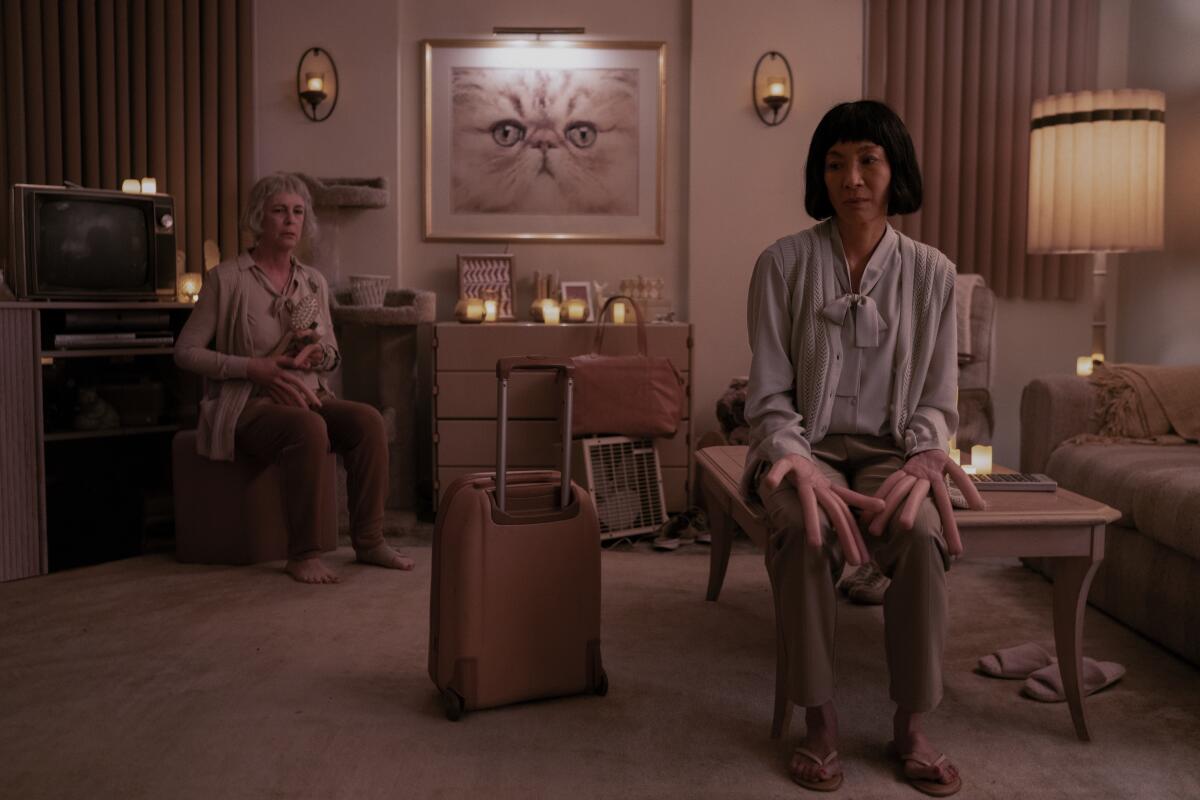
Michelle, how did you and Jamie Lee Curtis find such genuine tenderness in the universe where people have hot dogs for fingers?
Yeoh: That’s a crazy universe where we have evolved to the point where we have long digits, which are useless ... so we learn to play the piano with our feet. But the expression of love between two people is the same. It’s that wanting to be loved, sharing the love and the commitment of being together.
The hot dog dance with Jamie Lee Curtis, at first we were like, “Oh, you’ve got to be kidding me, right?” We went at it with such love, because it was a ritual; this was the way they expressed love for each other. It was their lovemaking scene. We thought you guys might find it ridiculous, but we are very sincere. And the way we went was hysterical.
Hsu: I think that’s why the movie works, why you feel like as an audience member you’re still holding on to the thread. You’re watching this thing that is profoundly weird, but you find your heart and your whole emotional self really invested.
There’s also a cultural specificity to Evelyn and Joy’s lives as Chinese American women that we very rarely see in Hollywood films, not just woven into the fabric of their home life but in their intergenerational dynamic.
Yeoh: In America we have a very big, strong Asian community, but we have not seen their stories being told this way. And it was such a great opportunity not just to tell the story of a very ordinary family that you know, but also to give them an opportunity to be a superhero. I’ve seen all these women, not just here in America but anywhere you have immigrants, trying to hold a family together, trying to make the best of it so that her child or her children will have a better future, but still unable to communicate love and understanding between them and the chasm between them gets bigger and bigger.
It was important that in the back of your mind, you’ve seen this woman in Chinatown or on the streets before. You recognize the auntie, the grandmother, the mother who has been with us for the longest time but never really had a voice and we’ve never seen her side of the story.
Hsu: So much of this film is also about not giving up on one another. To be an immigrant and raise a family and not give up on your family is a superhero feat. It is scary. It is ugly. It is messy. And if you can do it and if you choose not to give up, it is perhaps one of the most courageous things I can possibly think of.
There’s one universe where Evelyn jumps into an alternate life where she is a Michelle Yeoh-like movie star. Did they get it right?
Yeoh: That is a very superficial glam world. When you walk down the red carpet, the lights are flashing. But then there’s also a lot of sacrifice as well. Yes, she is now a superstar. She has all these bright lights, beautiful clothes and all that. But she has no family. She has no Waymond, and she has no Joy. And that was the first thing she realized when she came out of that. “Where’s Joy?” The first person that she was looking for. In this universe, Joy did not exist. Do you want that trade-off? It was very interesting because it’s about how we exercise our choice. And that makes a big difference in our lives.
More to Read
Only good movies
Get the Indie Focus newsletter, Mark Olsen's weekly guide to the world of cinema.
You may occasionally receive promotional content from the Los Angeles Times.
